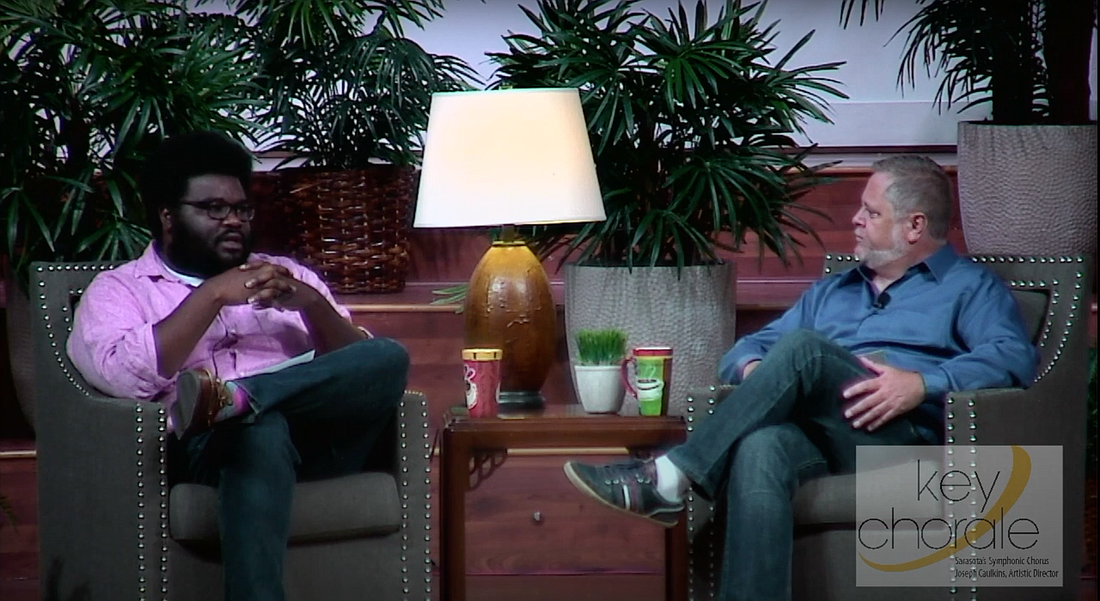- April 11, 2025
-
-
Loading

Loading

Jamal Sarikoki was 5 when his mother enrolled him in a classical arts conservatory to learn violin. Even then, he realized he didn’t see many other people like him.
“I was lucky to start with an African-American violin teacher,” Sarikoki said. “When I was doing competitions, when I was performing and youth orchestras and things of that nature, not just the talent within the orchestra was white, but also the leadership of the orchestras were white. And so it was really hard to see myself and see minorities represented in the orchestra, which caused for me a feeling as if I don't belong.”
It’s an issue Sarikoki, now an associate conductor with Key Chorale, has often discussed with his friend Joseph Caulkins, Artistic Director of Key Chorale. The duo have been close friends since Sarikoki joined the organization one season ago, and a cornerstone of their friendship is discussing current events and social issues after work.
They’re now looking to share those conversations with an audience. The duo premiered the first in Key Chorale’s new “Morning Coffee & Maestros” You Tube series on Friday, June 26. The hourlong conversation tackled the topic of race and how it affects the arts world. The hope for the series is to address relevant issues while connecting with Key Chorale’s audience that may feel isolated at this time — all over a cup of morning coffee.
“It’s a way to explore some of the topics that have been in our hearts, and over the last few months,” Culkins said. “We also want to allow that opportunity for the people that are watching to be part of the conversation.”
Sarikoki has seen change in representation in classical music as he's grown older but much of the current issue, in his mind, is a systemic disparity in the arts that starts from the top down. He believes diversifying administrative and artistic leadership positions can lead to positive change throughout the organizations. He recalls his first violin teacher leaving to form her own conservatory, and that many Black students were able to study under her and go on to musical success.
Caulkins and Sarikoki to address a number of different topics in their show — planned to be streamed live and then be released on You Tube — including choral season planning during the pandemic, music to listen to while in quarantine, and whatever else seems pressing in the moment. The duo aren’t planning too far in advance, as Caulkins wants to be able to adapt to the national conversation that’s happening any given week.
Most importantly, they believe their particular positions as conductors lend a greater level of empathy and communication with people. Conducting is a form of nonverbal communication with the performing musicians, and Caulkins is of the belief that the practice has given he and Sarikoki an increased understanding of communication and empathy.
“It's a really unusual medium because it involves people from diverse backgrounds coming together to make something homogeneous,” he said. “ I think the average person doesn't think about it from a conductor standpoint, but pretty much everything we do is communicating ideas and concepts.”
“We're generally, you know, in seclusion, and you don't really talk to us very often,” Caulkins said. “So it's kind of a nice opportunity to kind of get to see how it is, how it is we still we do and why, why we're wired as crazy as we are.”
Key Chorale has already had some success with online programs at the beginning of the pandemic. The group released a six-part You Tube series of choral rehearses with Sarikoki and other performers that drew in more than four thousand views. Caulkins hopes the new series can also bring in viewers to participate. The plan is to release a new episode every two weeks on Key Chorale's Youtube channel.